Having a plastic free bathroom is easier than you might think, and it doesn’t have to cost the earth either (excuse the pun.)
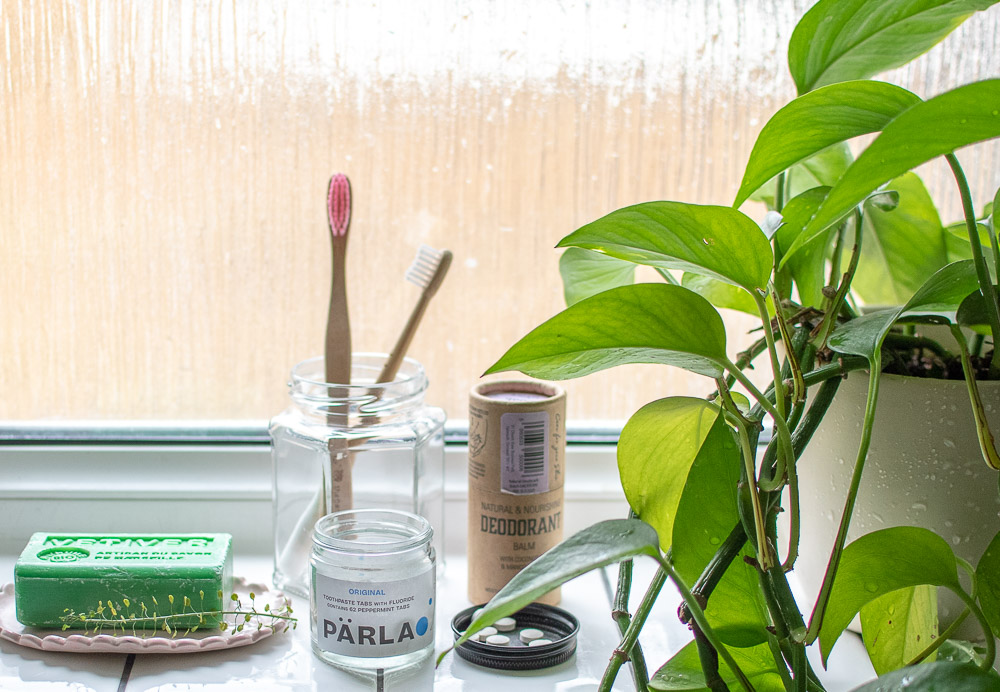
For as long as I can remember, there has always been a plethora of plastic bottles in our bathroom. They drive me nuts and that’s before I start thinking about the amount of landfill that’s there. So a couple of years ago, during Plastic Free July , I decided to purge plastic from our bathroom.
If I’m honest, my mission for a plastic free bathroom wasn’t totally successful. But 2 years is a long time and the plastic free toiletries that are available today are improved and much more readily available. So, I’d like to share with you some of the changes we’ve been implementing to make our bathroom plastic free.
Why Ditch Plastic In Your Bathroom?
We all know that plastic is an issue. It comes from crude oil, so every virgin piece of plastic made is using our earth’s precious resources. Also the process of doing this releases carbon dioxide into the atmosphere, contributing to the greenhouse effect. And that’s all before we start talking about its effect on sea life and our oceans. Or the fact it’s not being recycled as it should be. In short we need to use less plastic in our day to day lives. So I hope this post will help to give you some ideas of things you can swap for a plastic free alternative.
I promise, all these swaps are affordable, easy to carry out and family friendly. Lots of plastic free bathroom swaps are actually cheaper, but some are still more expensive. I hope, one day, this will change.
Simple Swaps to Make Your Bathroom Plastic Free
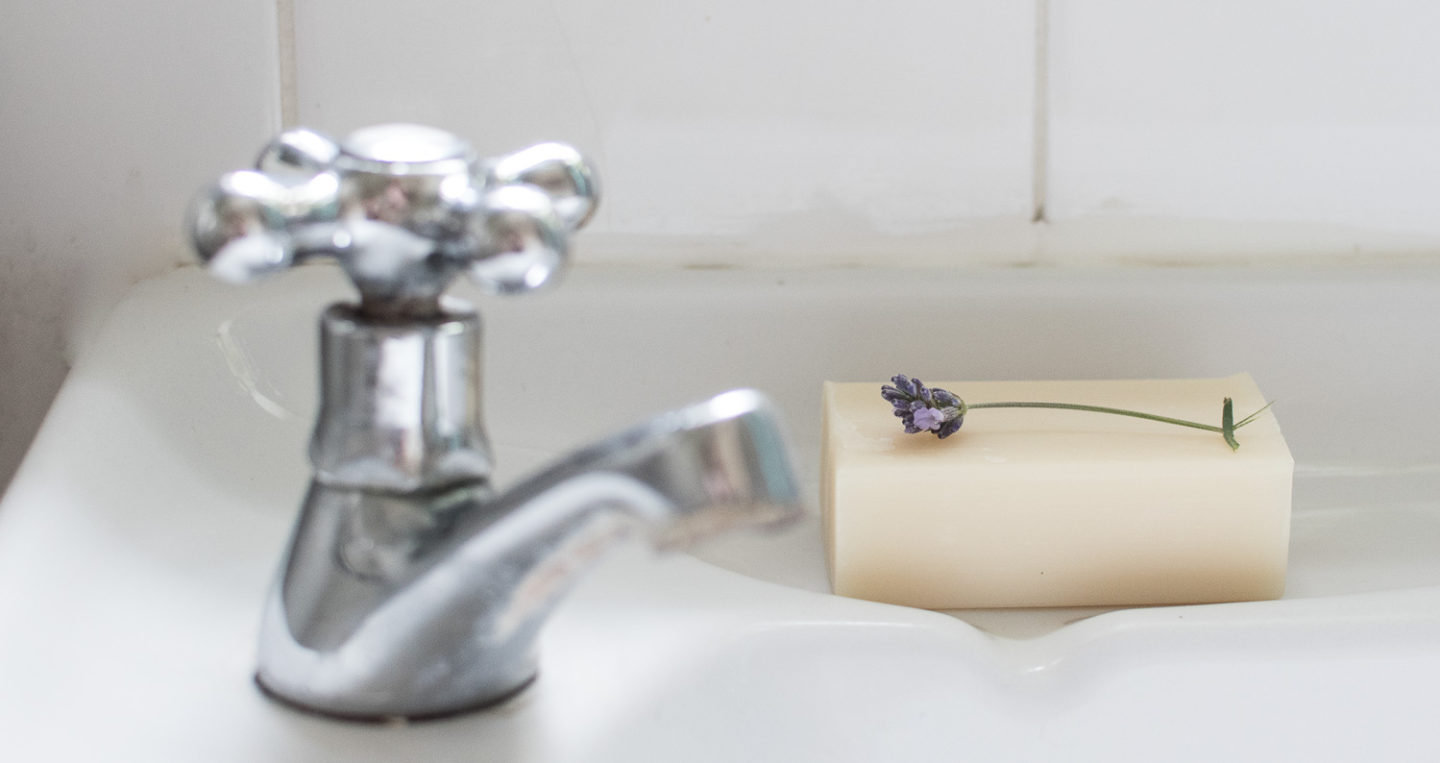
1.Bars of Soap
Why Change? Yes, we’ve switched squirty soap for old-fashioned soap bars, and here’s why. Most liquid soap is packaged in single use plastic, so ditching showing gel and liquid soap is a really easy way to make your bathroom plastic free. Also the transportation of bars of soap uses less energy than its liquid counterpart as they are smaller and lighter.
Quick Warning About Palm Oil
Liquid soap can also contain palm oil (actually so can bars of soap, but it is more likely to be an ingredient in liquid soap.) Now palm oil is a controversial ingredient and is actually found in more products than you can imagine; toiletries, food and other household goods. The main issue with it is that the production of it causes widespread deforestation and destruction of animal habitats. Some companies use RSPO Sustainable Palm Oil, which ensures that palm oil is produced in a way that doesn’t cause harm to the environment or society. It’s a complex issue because you’re talking about people’s livelihoods and there is an argument to say that without using sustainable palm oil more deforestation would take place. If you’re interested in looking into this further, read what the Little Soap Company have to say about it. All their palm oil is organic and RSPO accredited.
What we’ve changed to: Soap bars, which you can literally buy anywhere (!) Just avoid ones with plastic packaging.
2. Soap Dishes
If you’re using soap, you’ll want a soap dish to stop getting into a soapy mess. Here are a few suggestions for nice soap dishes that aren’t made of plastic.
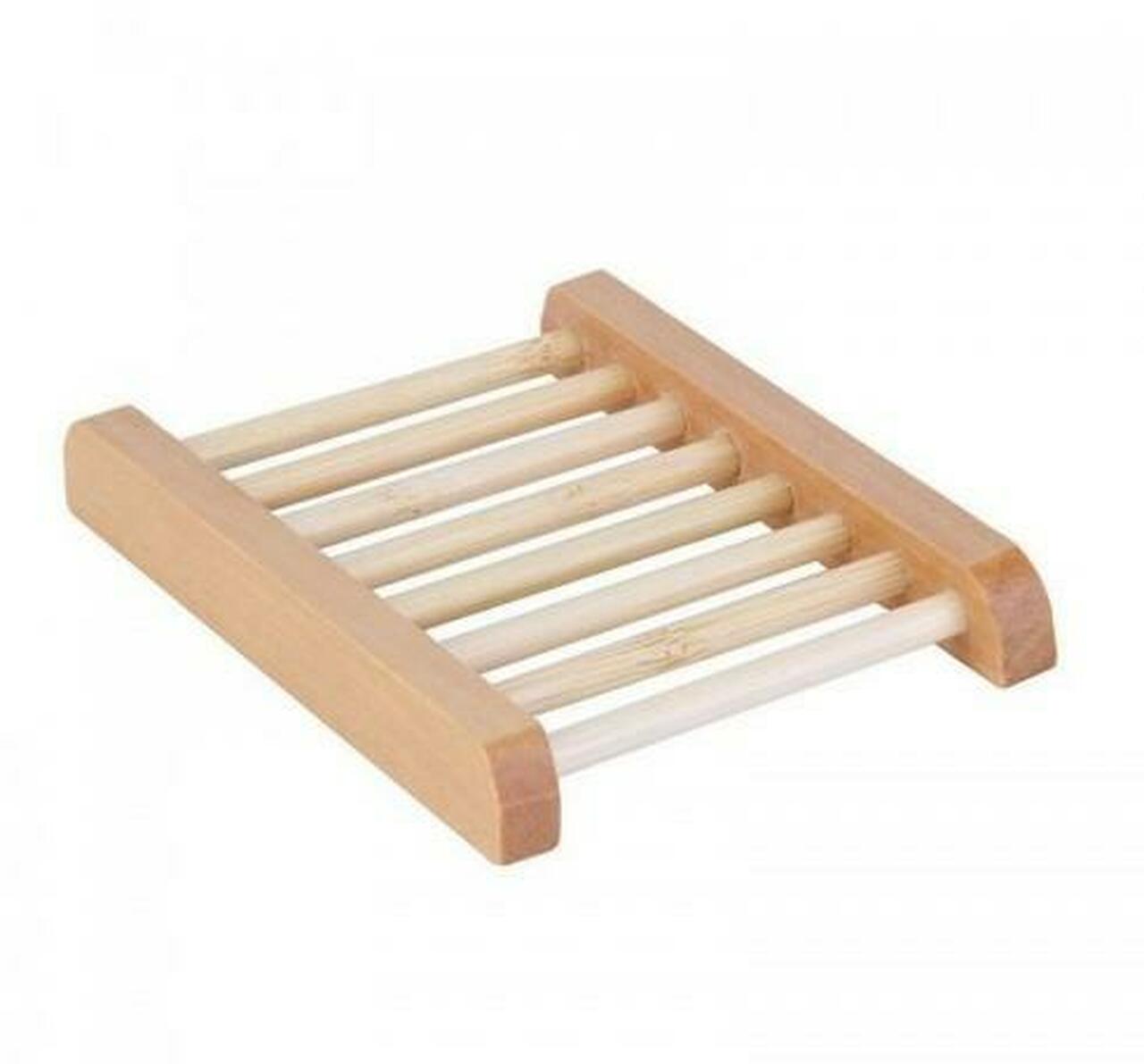
Hemp wood soap dish*, Wearth, £5.50 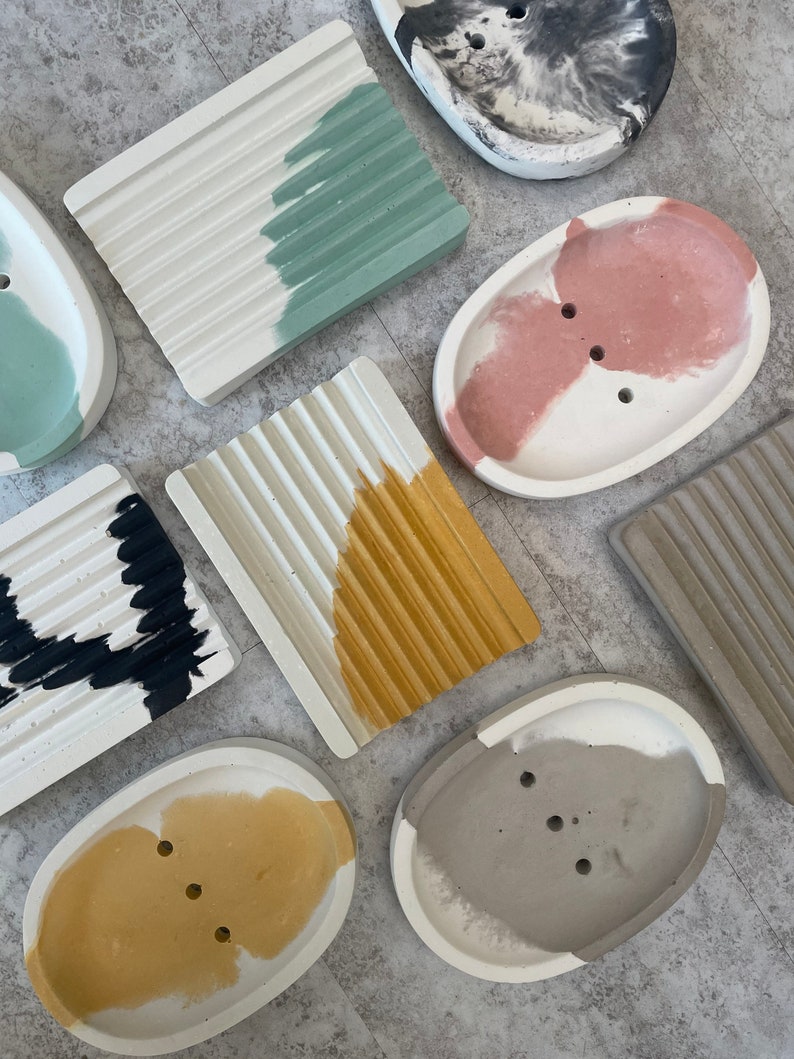
Marbled Concrete Soap Dish*, PartridgePartridge, £13 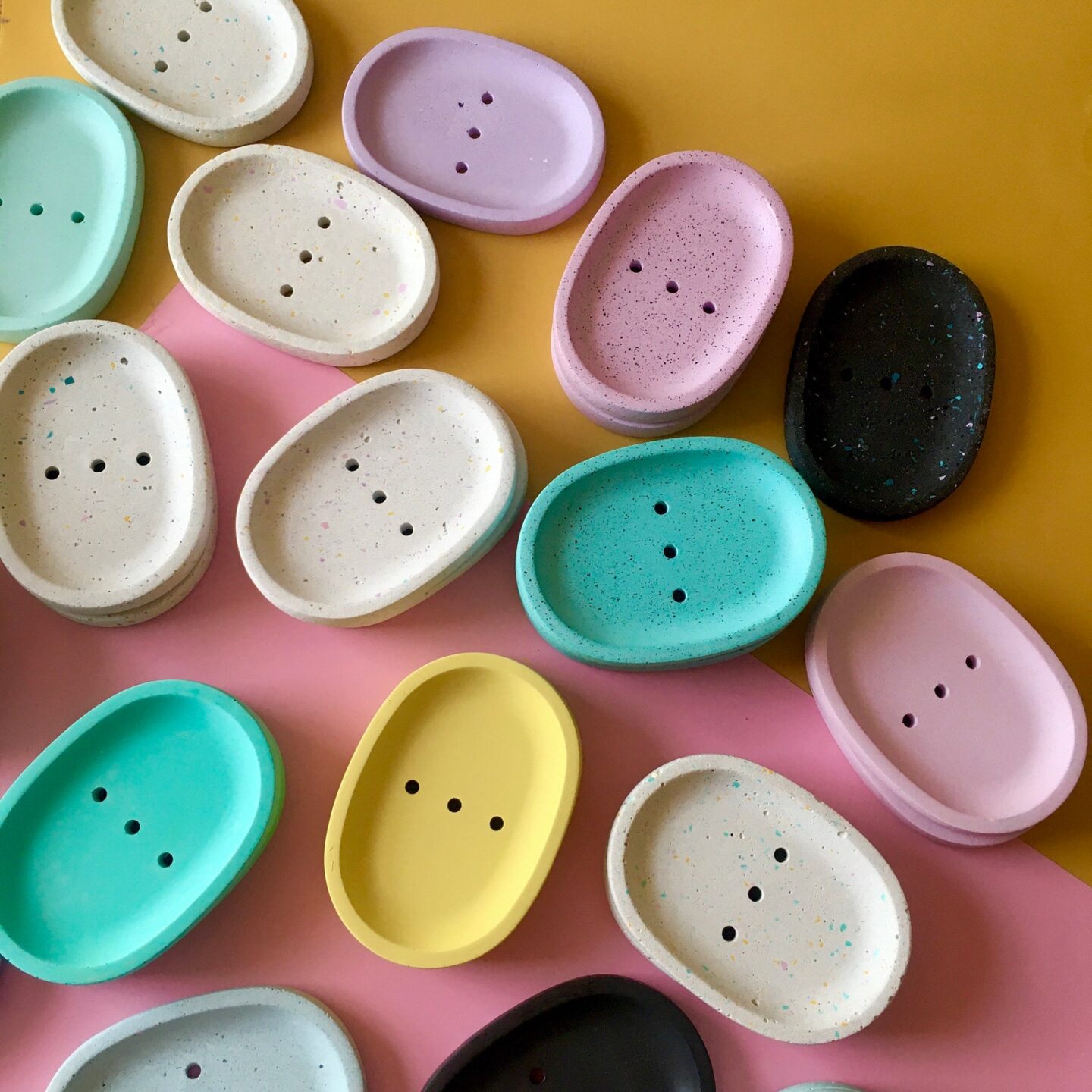
Jesomite Soap dish*, Glow Soap Shop, £12
2. Soap Pouches
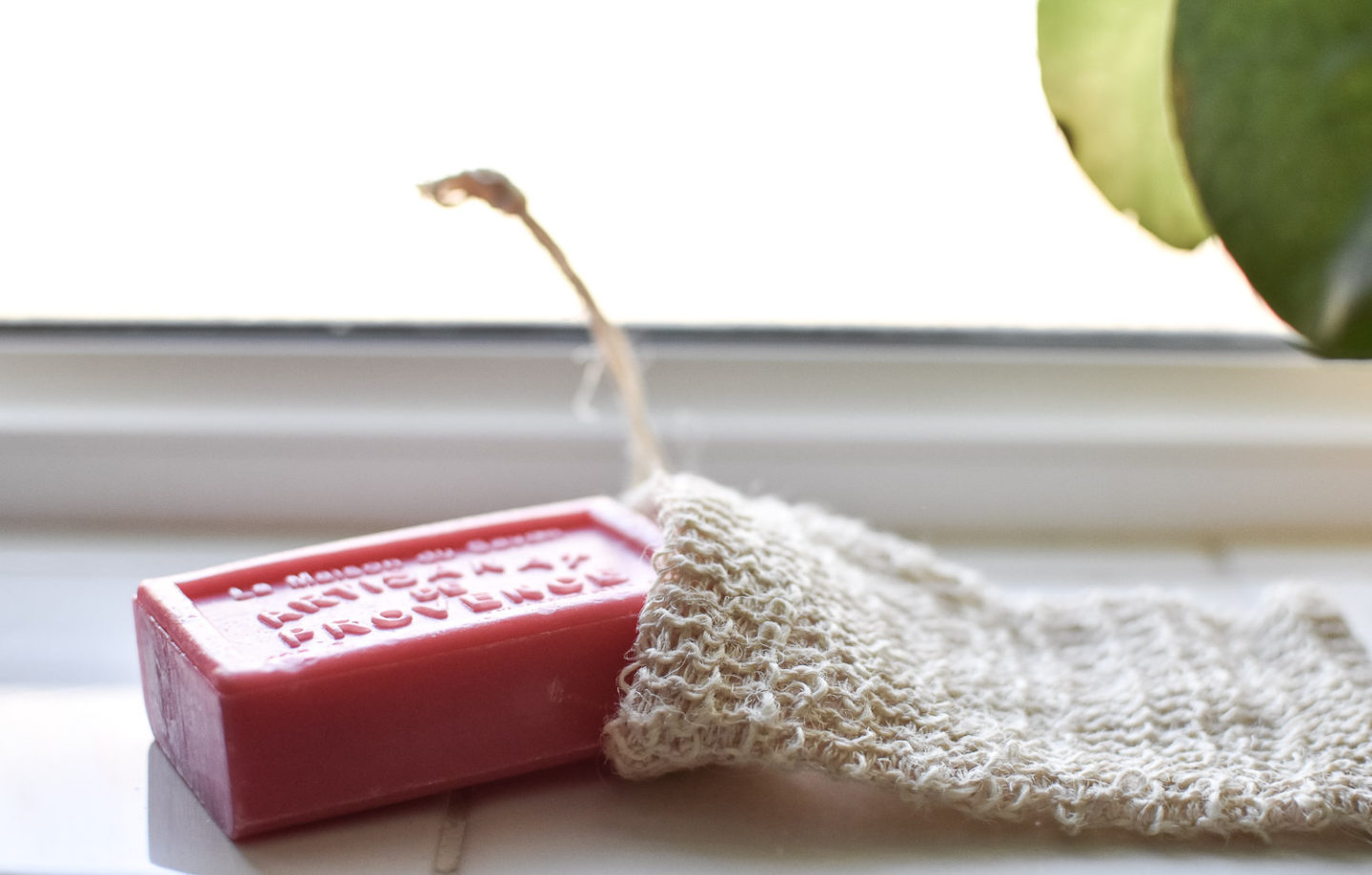
Or alternatively you could try a soap pouches.
Made from 100% biodegradable sisal this simple soap pouch from Hydrophil stops your bathroom getting into a soapy mess. It contains your soap, helps it to produce more foam and invigorates your skin as you use it. My husband and I are currently in two camps on this item. I love it instead of using a body scrub, and it’s great for getting rid of fake tan, but I don’t like to use it on a daily basis. My husband, however thinks it’s amazing, makes him feel super clean and uses it every day. It costs £3.50, is fair trade and lasts us about a year.
Where to buy: & Keep*, The Plastic Free Shop, £3.50
3. Bamboo Toothbrushes
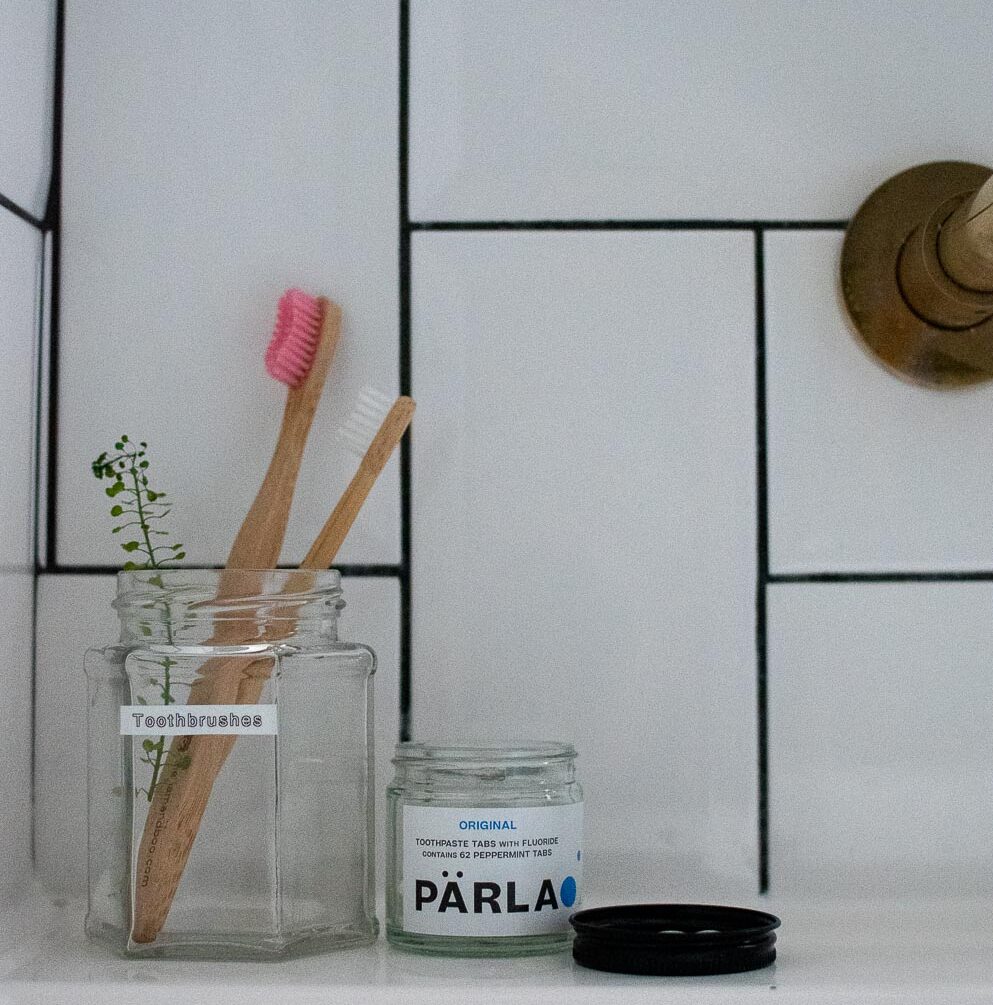
Why Change? It’s tradition in our household to change our toothbrushes on the equinox. But that means we are putting 20 toothbrushes a year into landfill. It’s been reported that 3.6 billion plastic toothbrushes are used worldwide each year. And of these, approximately 80% end up in the sea, wrecking havoc on the sea life. So we’ve switched to bamboo toothbrushes.
Bamboo is a fantastic material because it is quick-growing and compostable. However, the bristles are a little more complicated. The only fully compostable toothbrushes have bristles that are animal derived and use pig or badger hair. The bristles themselves are abrasive on your gums and if you’re vegan this is obviously a no no. I’m not vegan, but it still sounds a bit icky to me. Most bamboo toothbrushes use bristles that are plant-based and petroleum free, but that aren’t compostable. So at the end of their life you have to break off the head, pop that in the bin and compost the handle. There are lots of different companies who sell bamboo toothbrush subscriptions or one offs. Here’s a few suggestions.
Where to buy: &Keep* Boots*, Planet Organic, The BAM & Boo, The Humble Co. approx. £4 per toothbrush.
4.Toothpaste
Toothpaste is one area I’ve been nervous about changing, as teeth aren’t something you want to play around with. But I was prompted to look at different types of toothpaste as my daughter disliked the taste of the standard ones on the market.
Why Change? Tubes of toothpaste generally can’t be recycled due to the complex packaging needs to keep the ingredients fresh. The only way you can currently recycle most toothpaste tubes is if you can find a local terracycle drop off point. Click here to find one near you.
Also, there is also the issue of fluoride in toothpaste, which is hotly debated among dentists. There is evidence that fluoride helps to reduce cavities, however over exposure to fluroride can cause dental fluorosis (discolouration or pearly white lines on teeth) primarily among children. Personally I think it’s one you have to decide for yourself, after all we only get one set of teeth.
What are the options?:
Mineral Toothpaste in a glass jar
I love trying different toothpastes and these are the ones I keep coming back to. Geo Organics’ Mineral Toothpaste in English Peppermint, it comes in a glass jar, it doesn’t foam and is fluoride free. It was the only toothpaste taste I could cope with when pregnant with Clara. Some people find the texture of a mineral toothpaste a bit odd (not me!) But if that is you, you might want to try a toothpaste tablet. They also do a tooth powder, toothpaste tablets and have an orange flavoured range suitable for children.
Toothpaste Tablets
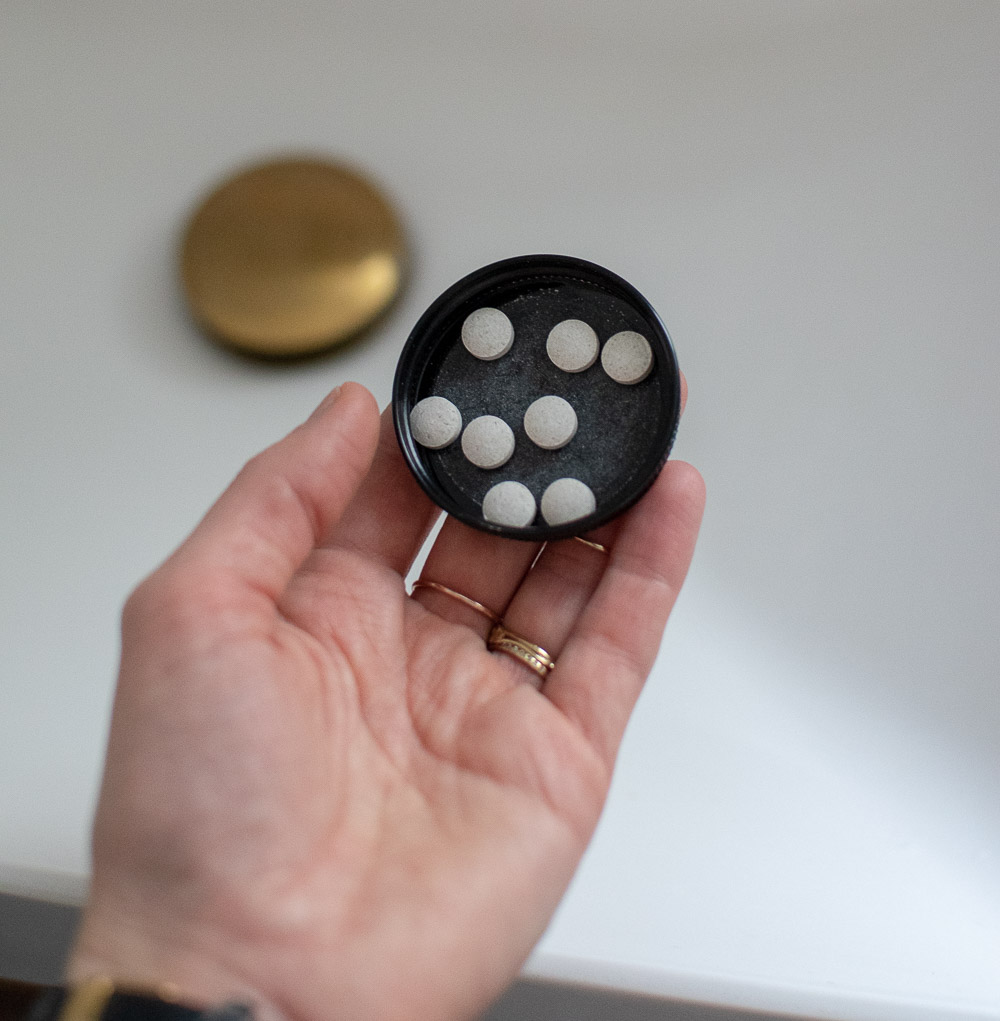
Because I haven’t totally made my mind up about the fluoride debate, I’ve also been using Parla tablets. You basically pop a tablet in your mouth crunch and then brush. The tablet gently foams and leaves your mouth feeling minty fresh and clean. These contain sodium monofluorophosphate to help fight tooth decay. They also have sodium methyl cocoyl taurate in them which is naturally derived from coconuts and is a cleansing agent that is far more gentle than sodium lauryl sulfate. Finally they are palm oil free.
Happier Toothpaste
Happier toothpaste tubes are made from aluminium which is easy to recycle. They also have a really clear transparent ingredients list and tell you what each ingredient does e.g. Cocamidopropyl Betaine, is from coconut oil (so a plant) and helps the toothpaste to gently foam. Their toothpaste does include Sodium fluoride. I’ve only just started trialing this toothpaste, so I currently can’t tell you how long a tube lasts.
Where to buy:
Geo Organics, £6.90 for a 60ml jar that will last you 1 month. Also sold at Holland & Barrett, Boots* and Planet Organic*.
Parla, Subscription £20 for 4 months supply (£5 a month) or a one off of £6.95 for a jar that will last you a month.
Happier, 1 tube £12, 4 tubes for £38.
For a good selection of eco toothpastes, have a look at My Little Eco Shop
5.Toilet Paper
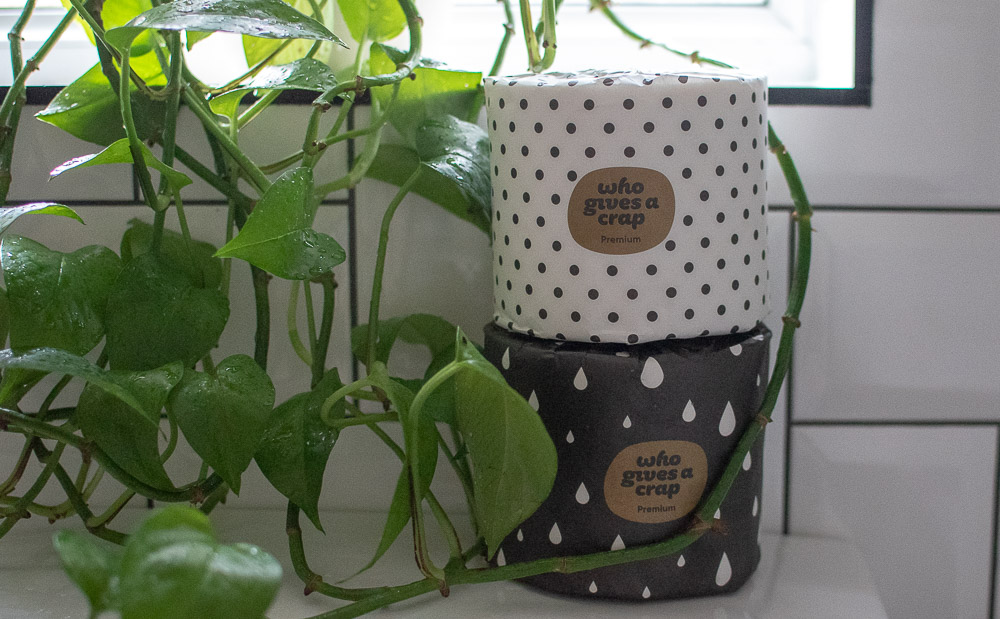
This is undoubtedly the change that has made me smile the most. Mainly due to the brand of toilet paper we are now using.
Why Change? When you buy recycled toilet paper from many supermarkets, it’s still packaged with that flimsy plastic packaging that cannot be recycled. Well if you give a crap about that sort of thing, then Who Gives A Crap is the brand of toilet paper for you. They offer both 100% recycled paper as well as their premium 100% bamboo toilet paper. All delivered to your door with a good dollop of humour. My husband loved receiving a box that told him “You’ve got a nice bum” Plus they give 50% of their profits to help build toilets for those in developing countries.
Where to buy: Who Gives A Crap, 24 rolls for £24 (the more rolls you buy the cheaper they are!)
For £5 off your first order click on this link. If you’d like to know more about this company then please click here for a recent blog post I wrote about them.
6. Plastic Free Shampoo Bars
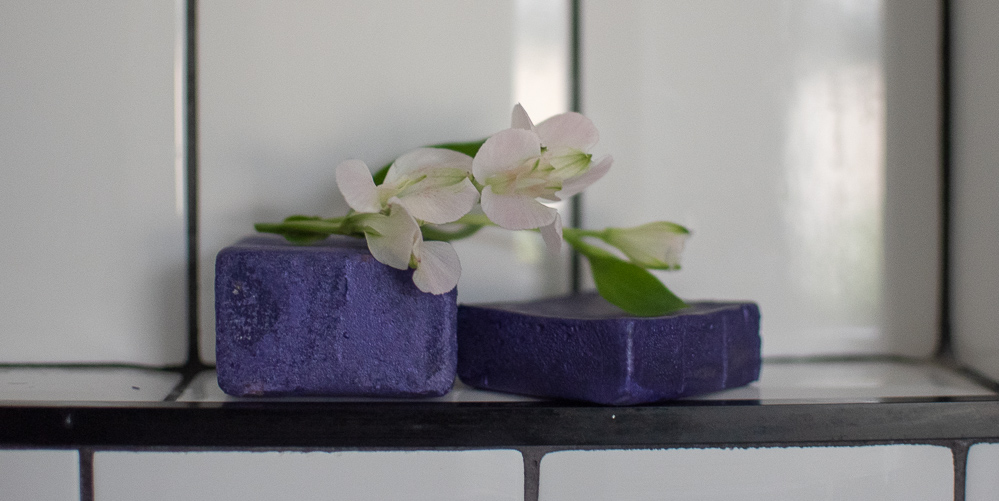
Why change? One of the simplest ways to reduce clutter and plastic bottles from your bathroom is by using solid shampoo bars. It’s basically really concentrated shampoo, without aqua, yes that’s water to you and me. Like soap, bars are cheaper to transport and don’t come wrapped in plastic.
One shampoo bar is roughly the equivalent of three plastic bottles of shampoo. Now you have to remember this when it comes to cost, as shampoo bars can initially seem a little expensive. Ethique’s Pinkalicious shampoo bar costs £12. But if you divide that by 3 = £4 per equivalent bottle which is a much more reasonable price.
What I’ve changed to: Obviously everyone has their own hair type, but my favourite brands are, Ethique, Lamazuna and Lush. I use Ethique’s Tone It Down shampoo & conditioner, which is perfect for dyed blond hair. I like to mix it up, so am also using Lamazuna’s shampoo for dry hair. My husband is using Lush’s Montalbano shampoo bar.
Something to note, Ethique has just launched a distribution centre in the UK, which is brilliant news has their products are awesome.
Where to buy: Ethique, Lamazuna, Lush, Holland and Barrett, Planet Organic *and many other plastic free online boutiques which one day I will write a post on.
7. Plastic Free Conditioner Bars
I have a slight confession to make, this section should really have been linked with the above. But I really wanted to have an even number of zero waste bathroom swaps for you. You get the point, a bar of conditioner is always going to be better for our planet than a plastic bottle.
8. Face Cleanser
While we’re on the subject of cleansing ourselves, what about a face cleanser? Now I appreciate this is something that you really have to get right for your skin and everyone’s skin is completely different. But I’ll talk you through a couple of plastic free options that I’ve enjoyed using.
What I’ve changed to: For cheap & cheerful days I use Eco Warrior’s Sensitive facial bar*. It has chamomile and calendula essential oils and doesn’t dry my skin out. The only downside is that is can sting a little if you get it near your eyes and it doesn’t remove eye make up (nor does it claim to) It costs £4 from Boots and lasts for ages.
For a nourishing skin treat, Ethique’s Bliss Bar is amazing, it’s really gentle and creamy as it has coconut butter in it. Though because the bar is softer it doesn’t last as long as the Eco Warrior bar. It costs £14 from Ethique. They also have a cleansing balm that takes of make up as well called Superstar, but I haven’t tried this yet.
Lastly for something that isn’t a bar! Upcircle’s Organic Cleansing Face Balm* is made with the fine powder of discarded apricot stones. It’s good at removing eye makeup as well as pollution and other impurities. This face cleansing balm, comes packaged in a glass bottle with aluminium lid, so fully recyclable. £18.99
Where to buy: Boots*, Ethique, Thought*
9. Safety Razor
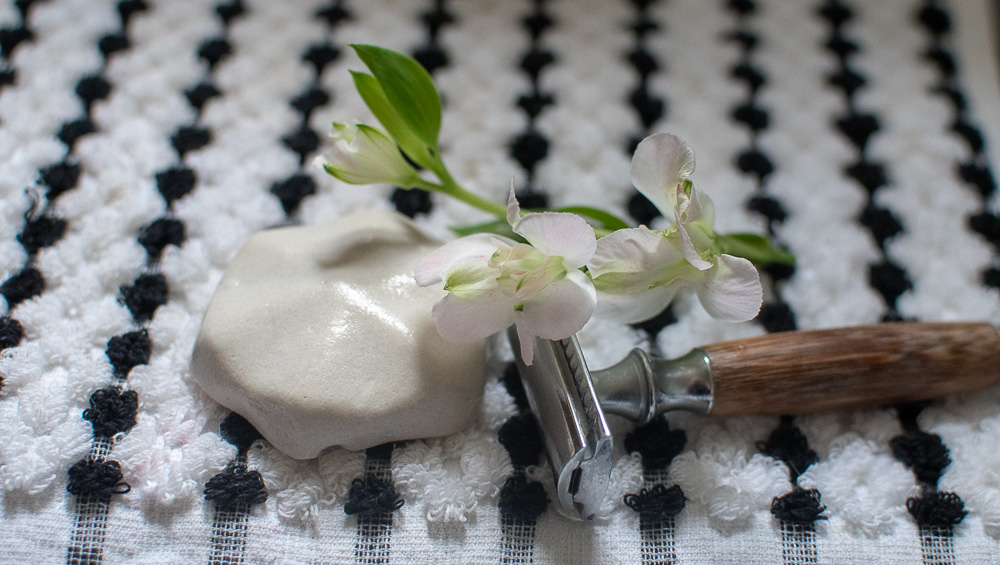
Ditch single use plastic razors in favor of a razor for life. I bought this bamboo safety razor from Acala Online years ago. It fits a double edged recyclable razor blade in it, which come wrapped in unbleached recycled paper. At the end of its life the bamboo is compostable and the metal recyclable, so all in all a great zero waste product. £22.99
Where to buy: Acala Online, £22.99
10. Shaving Bar
While we’re on the subject of shaving, I promise you really don’t need to buy shaving foam or gel, that comes in, yes, another plastic bottle! Lamazuna have a great solid shaving bar. Handmade in France with fairtrade, organic, shea butter it allows a close shave and leaves legs silky smooth.
Where to buy: Boobalou, £9.95
11. Face Mask
Let’s talk beauty, being a mum of three I rarely get an opportunity to do a face mask so my landfill from this activity probably isn’t that great. But I would like to introduce you to an amazing brand who allow you to get creative with your face masks Nini Organics. Their Natura Miracle Mask is as heavenly as it sounds. It’s a powdered clay formula in a recyclable glass container. The powder has antioxidant rich cacao, activated coconut powder, Australian pink clay as well as many other wonderful ingredients. You can make a mask with tap water, or co-founder Alex has some other exciting suggestions. Click here to watch his video.
Where to buy: Nini Organics, £35
12. Deodorant
Traditional deodorants, generally come in a plastic container, which even if recyclable will probably end up in landfill. I say this because in the UK we only recycle 46.2% of our plastic. And we don’t have the capacity to recycle all the plastic we produce, so lots of it gets exported. So for me it makes sense to buy deodorant in packaging that is reusable or easily recyclable like cardboard or a tin. There’s also the issue that many deodorants contain aluminium which actually blocks pores and can cause irritation or discomfort. So I prefer to use a natural deodrant. There are so many out there that I’m going to dedicate a whole blog post to natural deodorants at some point soon. But for now, these are just a few I love:
- Scence, £12, compostable packaging, vegan, natural & ethically sourced ingredients. Lasts approx 2-3 months
- Ethique, £11, plastic free, vegan, palm oil free, ethically sourced ingredients.
13. Plasters
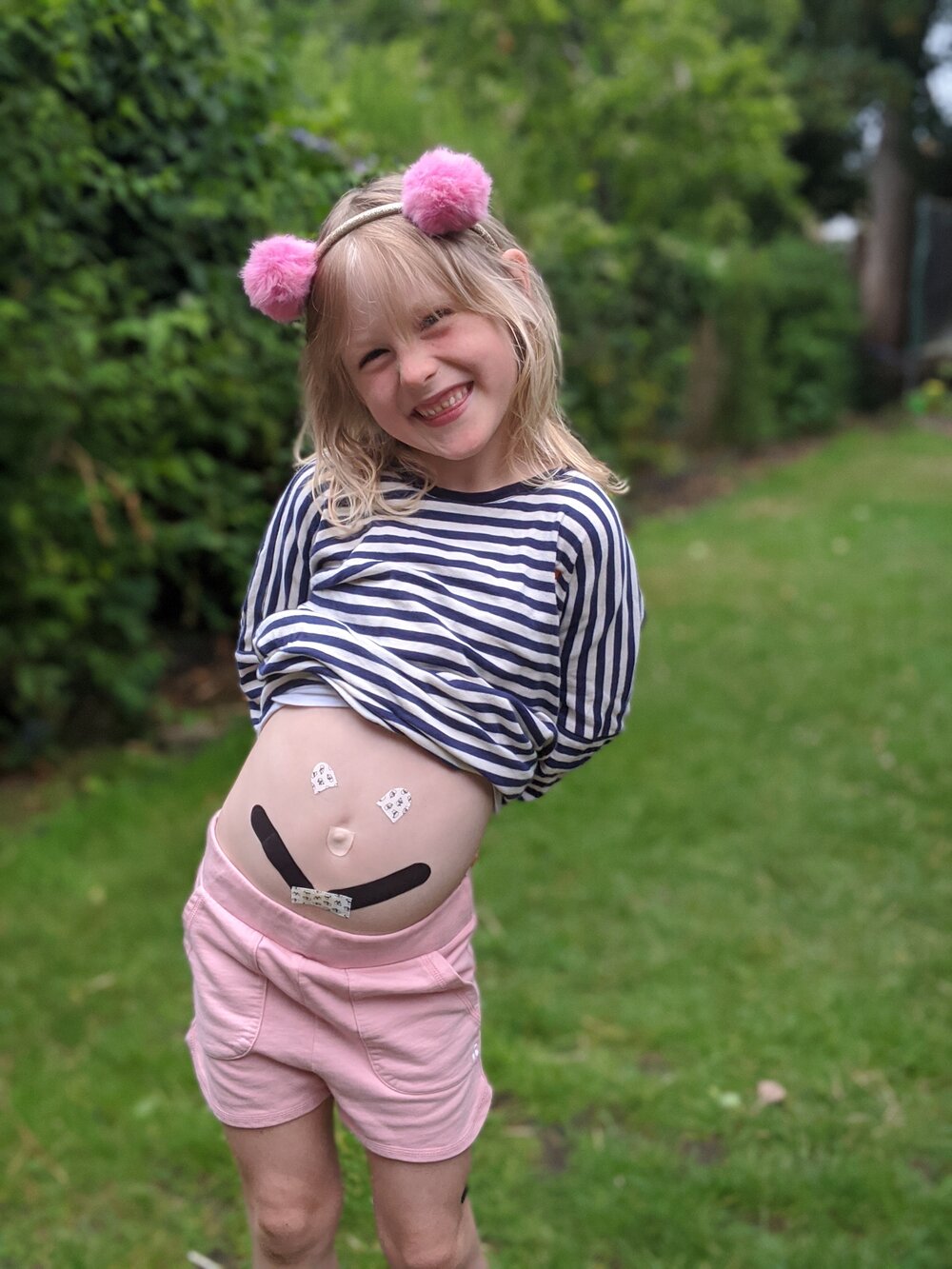
My children are forever falling over and scrapping their knees and elbows and Patch are our go to plasters. Not only are they merthiolate / thimerosal-free, which is a chemical often found in plasters designed to heal abrasions but that can actually be irritating to the skin. But they are also plastic free. Made from organic bamboo, the bamboo itself is antibacterial, thus helping the healing process. Also every part of the plaster & packaging considers our environment. From the recycled card tube, to the biodegradable plastic outershell.
Where to buy: Patch, Farmdrop, Ethical Superstore, £6.99
14. Bubble Bath
You don’t need a plastic bottle of bubbles with synthetic fragrances to help you destress and relax, instead there are plastic free options. Here are just a couple of my favourites.
Neil’s Yard Aromatic Foaming Bath is heavenly and is one that Father Christmas brings me every year. It comes in recyclable glass and has lavender, Spanish marjoram and geranium essential oils to help you unwind.
Beauty Kubes’ Bath Kube is a bit like a bath bomb, you break half of the cube and put it under the running water. Because it is sulfate free, it doesn’t bubble as much as you might expect. But this just means it is gentle on your skin. Ingredients include, oats, fine Cornish Kaolin clay, jojoba oil and coconut oil-derived surfactants, so a real nourishing treat for your skin. It comes wrapped in film that is made from plant materials and is home compostable. The cubes are also Vegan, and palm oil free.
Where to buy: Neil’s Yard, £15.50 (but it lasts me a whole year), Bower Collective, £5.95
And Finally…
I’m aware I haven’t covered everything that you’d need to change to make your bathroom plastic free. You see I’m currently experimenting with dental floss, solid body balm and facial moisturiser, But as I said my plastic free bathroom is a work in progress, as so many things in life are. So keep an eye out as I will update this post as I find more great products.
Thanks for reading x
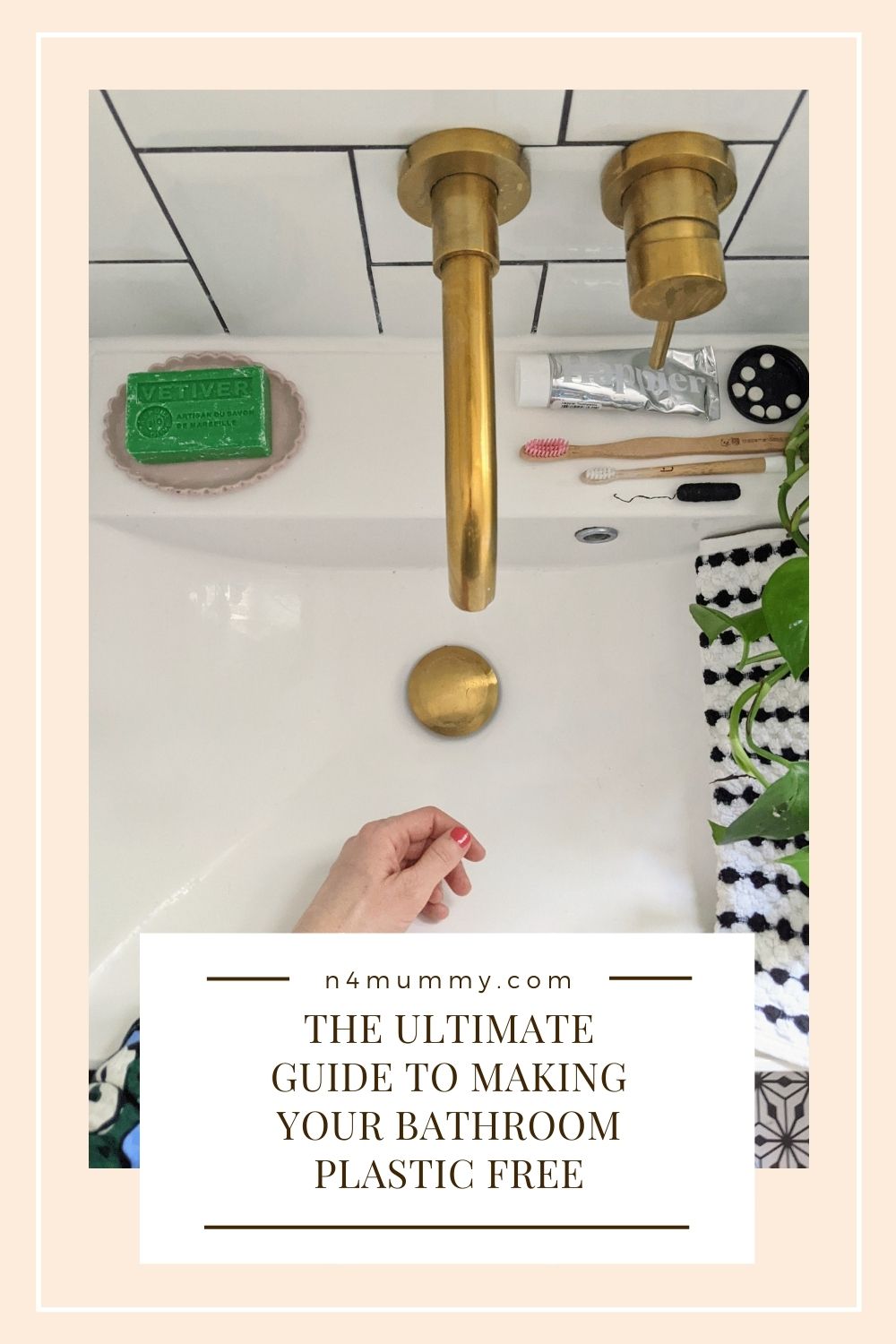
*Links marked with a * mean that if you purchase these products then I make a small commission, think of it as buying me a cup of (pink) tea 🙂 thanks x

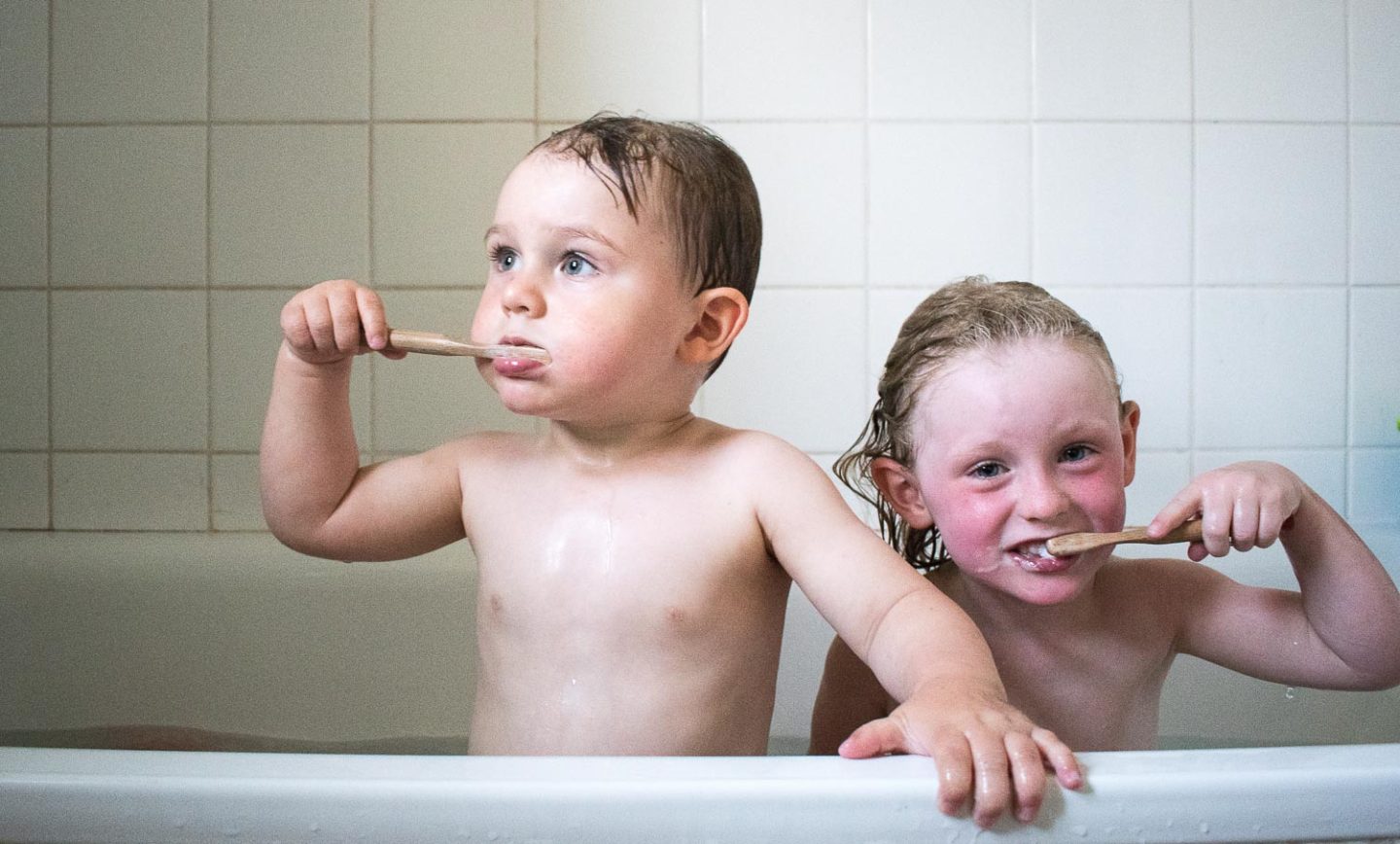
I love this. Thank you so much for sharing. Like you, I have begun the process of getting the plastic out of my bathroom. We use soap and shampoo bars and natural deodorant. But I am struggling with the whole teeth business! Do you know if any electric toothbrush heads that are recyclable? And I just can’t part with our usual toothpaste-probably because I have been vrsineashed to think this is what my families teeth need! xx
Author
Hi Sophie,
Thanks for your lovely comment and you sound like you’re a great job ditching plastic in your bathroom. Re electric toothbrush heads, there is a brand called Brushd that do Oral B & Philips Sonicare compatible heads. They are recyclable & come with a pre-paid compostable pouch that you can use to return them in so they get recycled correctly. I hope that helps ☺️ Karen XX
That’s a great post. One of my biggest worries has been swapping the toothpaste as after I started using a zero waste toothpaste one of my old fillings came out. Don’t know if a coincidence, but keeping a bit of toothpaste with fluoride in my life too.
Author
Thanks Triin for your feedback. I do think with toothpaste we have to be really careful as from what I can work out different people have different needs for fluoride for their teeth. I would suggest to anyone looking at switching to a natural alternative to read around the subject first and come to their own conclusions. xxx
So helpful and informative
Author
Thank you Rachel 😊 I hope it helps X